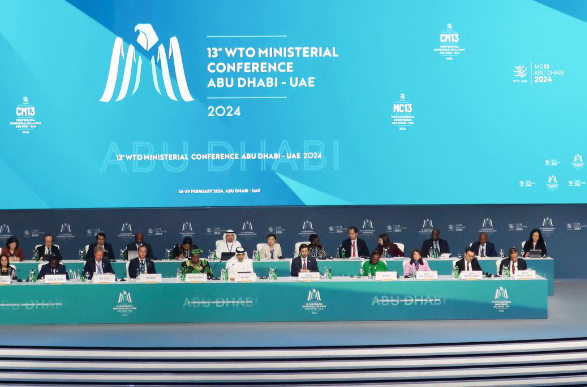WTO MC13 Ends With Limited Outcomes
After five days of negotiations between trade ministers from 164 member countries, the 13th WTO Ministerial Conference (MC13) concluded on March 1, 2024 without tangible progress on various contested issues. However, a temporary truce was agreed upon regarding e-commerce duties.
Key Priority Areas
India and other developing nations strongly pushed for permanent solutions on critical areas like food stockpile subsidies and COVID vaccine IP waivers alongside seeking a freeze on new e-commerce tariffs.
Fisheries subsidies reform for sustaining marine resources remained another key issue carried forward from the last Ministerial Conference (MC12) at Geneva.
Outcomes at MC13
Public Stockholding Programs
No outcome emerged on increasing subsidy limits for public distribution programs that developing countries utilize for ensuring food security.
TRIPS Waiver Proposal
The joint proposal by India and South Africa for temporarily waiving intellectual property protections on COVID vaccines and treatments failed to pass yet again.
Fisheries Subsidies
Despite missing agreed deadlines, the fisheries subsidies negotiations failed to finalize, getting extended upto 2024 now.
E-commerce Moratorium
Members agreed to retain the moratorium on customs duties for electronic transmissions until MC14 in 2025, avoiding fresh disputes.
Fundamental Divides
Entrenched differences between developed and emerging economies over fair farming subsidies, tech IP access and digital tariffs ended up hampering resolutions.
While India argued against rich nation agri-support skewing global trade besides seeking equity in health innovations access, advanced countries expressed reservations.
The United States also raised issues with India’s recent digital taxes which remain unresolved.
Way Forward
Director-General of the World Trade Organization, Ngozi Okonjo-Iweala noted that while tangible outcomes remain limited currently, important dialogues happened dispelling some distrust. Members will continue to work through envoy-led technical discussions on the complex 21st century trade matters revealed at MC13.
She expressed hope that parties will utilize the two-year window for building shared understanding and parameters for decisions that boost equity and growth globally.
The lack of substantive consensus at MC13 highlights the pressing need to reform WTO’s negotiation frameworks to support equitable and inclusive economic gains from globalization.
As emerging faultlines underscore nationalism threatening trade openness, the Geneva-based body must reinforce relevance by channelizing comprehensive agreements that balance sustainability with development for all country groupings.
Month: Current Affairs - March, 2024
Category: Summits and Conferences








